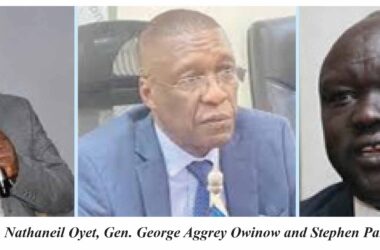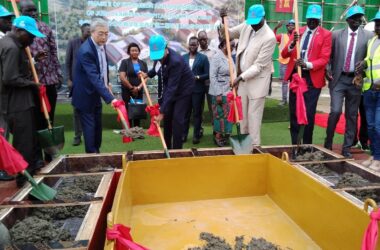By William Madouk
Leaders of the Great Lakes Region converged in Juba for the 29th meeting of the International Conference of the Great Lakes Region (ICGLR), meant to eradicate illicit mining trade that robs the region of millions of dollars.
In his opening remark, the Undersecretary in the Ministry of Mining, Dr. Cosmas Pitia, said African nations are blessed with minerals, but for sake of exploitation, they are inflicted with violence.
“Mining is the backbone of most of the countries in Africa, and subsequently we are not left alone—most of these countries, which are rich in minerals, are all affected by violence,” stated Pitia.
“And that is only to pave the way for illegal exploitation of our mineral resources; that is why we are all affected by violence,” he added.
The undersecretary, who is also the guest of honor, added that Great Lakes is tasked with bringing an end to that narrative.
Mr. Pitia emphasized that “the natural resources in our countries are supposed to be well for us, but unfortunately in most countries it has become a curse on us, which is why we have to work all together very hard.”
He continued that this move will eradicate illegal exploitation of the minerals and other natural resources.
Besides, Pitia revealed that the upcoming event on 6-8 of November will be a forum of value addition, cross-border trade, and manufacturing of factories, paving the way for employment chances.
“It is a pride that Africa is now trying to add value to our natural resources in order to be manufactured locally and to provide employment to our youth.
To him, the majority of youth put their lives at risk when crossing the Mediterranean and other seas in search of a better life overseas; adding that value can bring that to an end via sound resource management.
“We can put an end to that through the responsible exploitation of our natural resources in our own countries.”
From his part, the ICGLR regional committee chair, Estanislau Buio, appreciated the government of South Sudan for hosting 29 meetings of the ICGLR on illicit mining in the region.
He added that during the two-day meeting, experts would present reports and databases on illegal mining in the region.
Ms. Scholastica Mwau, who represents the ICGLR Executive Secretary, said one of the key priorities during the meeting is to review the draft Mineral Declaration on the Regional Initiative Against Illegal Exploitation of Natural Resources.
“This declaration will be presented for consideration at the upcoming ICDR Head of State and Government Summit,” Ms. Mwau said.
She added that this document, shaped by inputs from all member states, underscores collective stance against illegal activities that undermine not only sovereignty but also destabilize communities and hamper socio-economic development.
“The complexity of cross-border mineral flows and emerging technological demands require an even more coordinated approach,” she advised.
Amb. Juma Dimo Amoi, representing South Sudan’s ICGLR National Coordinator, said South Sudan joined the ICGLR a few months after its independence and became the 11th member state.
“Today we are proud, hosting the 29th meeting of the ICGLR as the first of its kind in our country,” Amoi stated.
The Ministry of Mining, ICGLR, and partners organized the event under the theme “a Harmonized Regional Approach for Mineral Value Addition and Cross-Border Trade for the Maximization of Benefits from Mineral Resources and Promotion of Peace and Stability.”
ICGLR is an intergovernmental body that brings together 11 countries in an attempt to bring about sustainable peace, security, and development.
It was founded in the 1990s, at a time of conflicts in the DRC and the 1994 Rwanda genocide. Its members are Burundi, the Central African Republic, the Republic of Congo, the DRC, Kenya, Uganda, Rwanda, Sudan, Tanzania, Zambia, Angola, and South Sudan.
In October last year, ministers from the Great Lakes region met in Nairobi to draft a plan to combat the illicit trade in minerals. Part of the strategy included plans to harmonize laws, formalize the mineral sector, increase transparency, and create a database to trace the origin of minerals.




